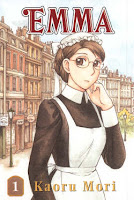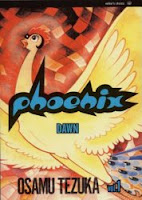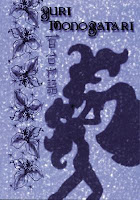Support manga, support your library!
Here’s what I’ve been reading:
 Emma, Volumes 1-3 by Kaoru Mori. Emma is a series that has sadly gone out of print and is becoming progressively more difficult to find. Fortunately for me, my library has the entire series. The artwork is simpler in Emma than in Mori’s later manga, but Mori still devotes attention to even the smallest details. Of particular note is the amount of historical research put into Emma; it portrays Victorian-era London in a very realistic way. There is an overarching story to the series, but these first few volumes of Emma felt fairly episodic to me. The series focuses on the eponymous Emma, a maid, who falls in love with William Jones, the son of a wealthy merchant, and the difficulties that their class differences bring them.
Emma, Volumes 1-3 by Kaoru Mori. Emma is a series that has sadly gone out of print and is becoming progressively more difficult to find. Fortunately for me, my library has the entire series. The artwork is simpler in Emma than in Mori’s later manga, but Mori still devotes attention to even the smallest details. Of particular note is the amount of historical research put into Emma; it portrays Victorian-era London in a very realistic way. There is an overarching story to the series, but these first few volumes of Emma felt fairly episodic to me. The series focuses on the eponymous Emma, a maid, who falls in love with William Jones, the son of a wealthy merchant, and the difficulties that their class differences bring them.
 The Kurosagi Corpse Delivery Service, Volumes 1-11 written by Eiji Otsuka and illustrated by Housui Yamazaki. Even though I had previously read much of The Kurosagi Corpse Delivery Service, I had forgotten how funny the series is. Granted, it’s very dark humor, which isn’t to terribly surprising from from a manga with so many supernatural horror elements. But all of the horror and gore is balanced by a cast of likeable, quirky characters. One of the things I like best about The Kurosagi Corpse Delivery Service is that the creators take inspiration from real life events, mixing them with traditional Japanese ghost stories and urban legends. The series is mostly episodic, with stories generally ranging from one chapter to an entire volume in length.
The Kurosagi Corpse Delivery Service, Volumes 1-11 written by Eiji Otsuka and illustrated by Housui Yamazaki. Even though I had previously read much of The Kurosagi Corpse Delivery Service, I had forgotten how funny the series is. Granted, it’s very dark humor, which isn’t to terribly surprising from from a manga with so many supernatural horror elements. But all of the horror and gore is balanced by a cast of likeable, quirky characters. One of the things I like best about The Kurosagi Corpse Delivery Service is that the creators take inspiration from real life events, mixing them with traditional Japanese ghost stories and urban legends. The series is mostly episodic, with stories generally ranging from one chapter to an entire volume in length.
 Phoenix, Volumes 1-3 by Osamu Tezuka. Phoenix was considered by Tezuka to be his life’s work. Unfortunately, much of the series is now out of print in English. (Thank goodness for libraries.) Phoenix is a mixture of historical fiction and science fiction. Each volume alternates between the past and the future, slowly converging towards the present. The themes of death and rebirth and the cyclical nature of life echo throughout the manga. The stories in each volume stand alone, but they also reflect and mirror one another. I actually haven’t read much of Tezuka’s science fiction before, so I found that to be particularly fascinating. I can see the influence his work has had on later mangaka.
Phoenix, Volumes 1-3 by Osamu Tezuka. Phoenix was considered by Tezuka to be his life’s work. Unfortunately, much of the series is now out of print in English. (Thank goodness for libraries.) Phoenix is a mixture of historical fiction and science fiction. Each volume alternates between the past and the future, slowly converging towards the present. The themes of death and rebirth and the cyclical nature of life echo throughout the manga. The stories in each volume stand alone, but they also reflect and mirror one another. I actually haven’t read much of Tezuka’s science fiction before, so I found that to be particularly fascinating. I can see the influence his work has had on later mangaka.
 Yuri Monogatari, Volume 2 by Various. I wasn’t quite as taken with the second volume of Yuri Monogatari anthology as I was with the first, but I still found it to be an enjoyable collection. (And it’s much easier to find.) The series is a collection of yuri-themed stories published in English. The stories range from the realistic to the fantastic. Once again, Althea Keaton’s contribution was particularly strong. But my favorite work in this anthology was Beth Malone’s “Night Out.” Yuri Monogatari features many of the same creators who contributed to the first volume as well as a few newcomers, which was nice to see. For some reason, toasters (yes, the kitchen appliance) came up in multiple stories, which was a little odd but kind of fun.
Yuri Monogatari, Volume 2 by Various. I wasn’t quite as taken with the second volume of Yuri Monogatari anthology as I was with the first, but I still found it to be an enjoyable collection. (And it’s much easier to find.) The series is a collection of yuri-themed stories published in English. The stories range from the realistic to the fantastic. Once again, Althea Keaton’s contribution was particularly strong. But my favorite work in this anthology was Beth Malone’s “Night Out.” Yuri Monogatari features many of the same creators who contributed to the first volume as well as a few newcomers, which was nice to see. For some reason, toasters (yes, the kitchen appliance) came up in multiple stories, which was a little odd but kind of fun.

Speak Your Mind